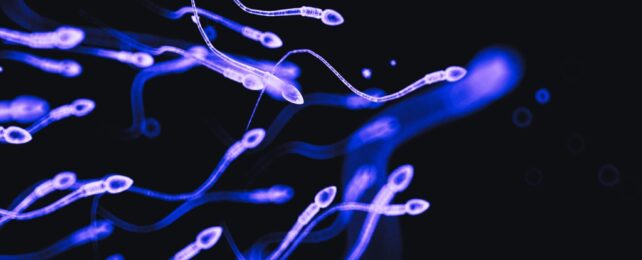Insecticide exposure has been linked to lower sperm concentration in adult men worldwide, according to a new review of 25 studies spanning almost 50 years. The research team from Italy and the US says it's the most thorough systematic review of the topic so far.
These are strong findings as their method takes into account each study's limitations, so their published paper recommends reducing exposure to the two types of insecticides studied to preserve male fertility and increase the changes of parenthood.
"Understanding how insecticides affect sperm concentration in humans is critical given their ubiquity in the environment and documented reproductive hazards," says first author Lauren Ellis, a population health scientist at Northeastern University.
"Insecticides are a concern for public health."
She notes people are primarily exposed to insecticides through the consumption of contaminated food and water.
Ellis and colleagues looked at data from 1,774 adult men in four continents (Asia, North America, South America, and Europe) across 21 study populations who were exposed to organophosphates and N-methyl carbamates.
These commonly-used insecticides' main mode of toxicity is the inhibition of enzymes involved in the normal breakdown of neurotransmitters like acetylcholine.
"No matter how you looked at it, the smaller studies or the larger studies, there was a consistent association with increased exposure to insecticides associated with decreased sperm concentration," explains senior author Melissa Perry, an epidemiologist and microbiologist at George Mason University.
When two possible factors that could modify the effect were taken into account – being exposed to other reproductive toxins and medical risk factors for low sperm concentration – that association got stronger.
The researchers note other studies have shown that semen quality is declining over time.
A review in 2022 found that the average sperm count among participants, who were not considered infertile dropped by 51 percent between 1973 and 2018, from 101.2 million to 49 million per millilitre of semen. That's still well within the World Health Organization's "normal" range.
There's a correlation between low sperm concentration and other factors of male health too, such as an increased risk of some cancers. However, finding two things to be related doesn't prove that one is responsible for or a result of the other, and we still don't know the mechanism behind the effects.
"It is difficult to specify a single biological mechanism of effect that explains the adverse associations observed in this comprehensive review," the authors acknowledge, "as mechanistic and animal evidence indicate there are many ways organophosphates and N-methyl carbamate insecticides can harm sperm concentration."
There are other important factors that could impact fertility over time. Air pollution has been linked to less sperm production in both humans and animals in multiple past studies.
Recent research in mice suggests pollution is driving this loss of sperm production via inflammatory processes in their brains.
When it comes to organophosphates, the team recommends further research on glyphosate in particular, as its neurotoxic effects have been studied, yet data on its effect on sperm production appears to be lacking. There are also limited studies on N-methyl carbamates, but still the findings show there is a clear link.
"The evidence available has reached a point that we must take regulatory action to reduce insecticide exposure," Perry says.
The study has been published in Environmental Health Perspectives.
